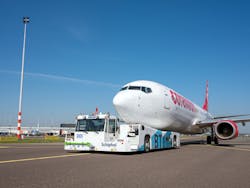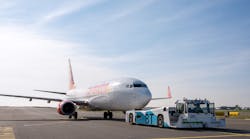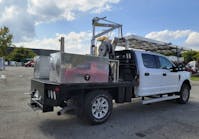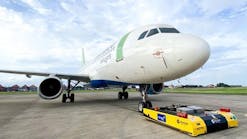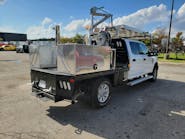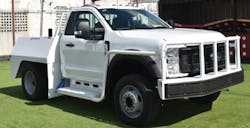Sustainable Taxiing with TaxiBot Uses Half the Fuel of Standard Taxi Process
Research carried out by Schiphol and TaxiBot partners in the sector has shown that sustainable taxiing uses at least 50% less fuel than standard taxiing. This can lead to significant environmental benefits as planes produce fewer emissions at the airport. The viability study revealed that major adjustments need to be made to infrastructure, processes and technology for sustainable taxiing to become standard procedure at Schiphol. All parties involved are identifying the steps necessary to make sustainable taxiing the standard procedure by 2030.
Schiphol conducted the research together with Air Traffic Control the Netherlands (LVNL), KLM, Transavia, Corendon Dutch Airlines and ground handling companies dnata and KLM Ground Services. The study is part of the aviation sector's Smart and Sustainable plan and of the Ministry of Infrastructure and Water Management's agreement for sustainable aviation. The conclusions of the research were drawn based on the results of the TaxiBot pilot study, simulations of fully sustainable taxiing at the airport and input from operational experts. The TaxiBot is a semi-robotic hybrid towing vehicle designed for taxiing airplanes from the boarding gate to the takeoff runway without the use of jet engine power.
Kerosene Consumption Halved
During the 2020 pilot, narrow-body aircraft were taken to and from the runway by a TaxiBot: a unique semi-robotic aircraft towing vehicle provided by Smart Airport Systems and jointly developed by TLD and Israel Aerospace Industries. The TaxiBot enabled aircraft to keep their engines off for most of the taxi process. This resulted in fuel savings of around 50%, depending on which runway was used. Fuel savings can be as high as 65% when an aircraft is taxiing to the Polderbaan in AMS – the runway with the longest taxi time.
A Reality by 2030
The feasibility of introducing the operational concept of sustainable taxiing at Schiphol was also investigated. Safety, capacity and efficiency at the airport were the main focus points, along with the environmental benefits. Some significant adjustments to infrastructure, processes and technology are needed for sustainable taxiing to become standard procedure at Schiphol by 2030. Because many of these essential adjustments are new to aviation, and because Schiphol is the first airport in the world that wants to implement sustainable taxiing on a large scale, it will take some time for the technology and infrastructure to be developed and for it to be certified and approved.
Joint Roadmap
Schiphol and partners in the sector are working on a roadmap containing solutions and adjustments in order for sustainable taxiing to be established as standard procedure at Schiphol by 2030 at the latest. Another pilot study starts in spring 2022 as part of a European program, the Albatross project, that will see several TaxiBot coming to Schiphol.
"We remain committed to sustainability and innovation, even during the coronavirus crisis. Coming back improved is the norm. It's great that we are working with the aviation sector to advance sustainable taxiing" says Dick Benschop, president and CEO of Royal Schiphol Group.
